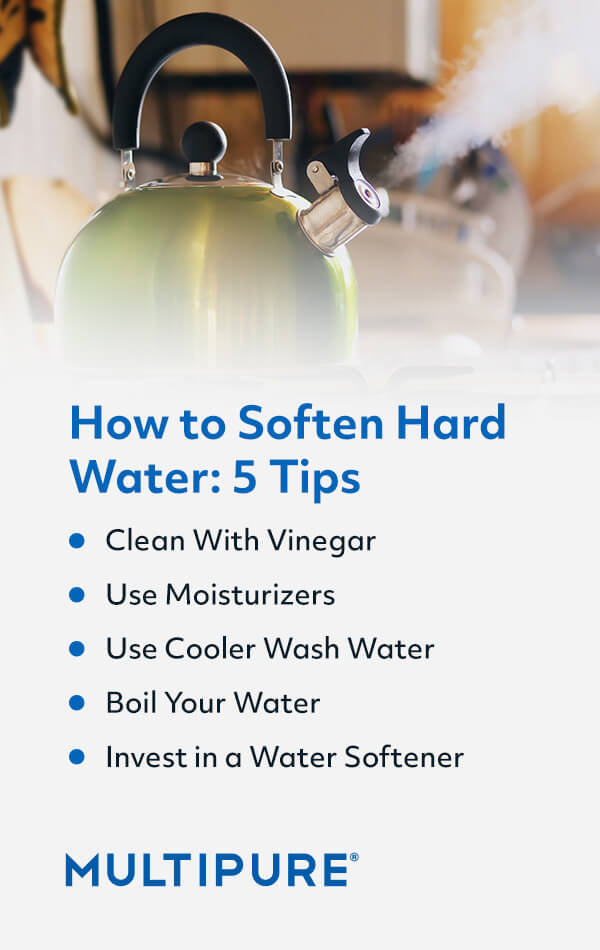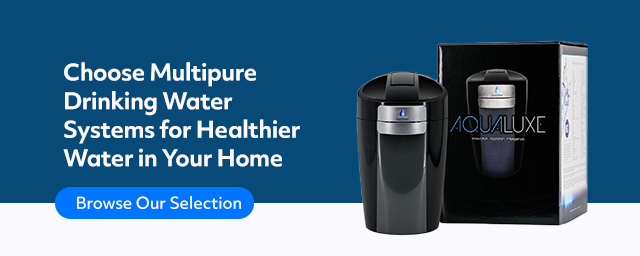How to Tell if You Have Soft or Hard Water
May 10th 2023
Hard and soft water are terms that can determine the mineral and chemical levels in your water. High calcium and magnesium levels contribute to harder water. The mineral buildup can impact how well your appliances run, how easy it is to keep dishes clean, and how your laundry appears after a wash. In contrast, soft water doesn't have high concentrations of minerals, helping your appliances run more efficiently and keeping clothes and dishes looking cleaner.
While hard water can be a nuisance for many homeowners, softening it can prevent its adverse effects on your property.
What Is Hard Water?
Hard water is determined by a higher concentration of minerals like calcium and magnesium. While safe to drink, hard water can impact your property and appliances. For instance, soap reacts to the calcium to form scum, making it more challenging to get things clean, whether that's your hands, hair, dishes, or laundry.
But what causes hard water? Water is a solvent, picking up impurities easily. The groundwater movement of water often causes sedimentary rocks to dissolute, especially calcium carbonate rocks like limestone. In other words, as water moves downstream, it flows over these rocks, dissolving the minerals and holding them in a solution that ends up in your home.
Hard water is more prevalent in the east-central and western U.S., revealing the distribution of carbonate aquifers and aquifers with high concentrations of dissolved solids in these regions.
How to Tell if You Have Hard Water
Identifying hard water can be as easy as quickly inspecting your kitchen and bathrooms. You can spot signs of hard water buildup on faucets, drinking glasses, shower walls, and clothing. You can also feel the effects on your skin since hard water tends to leave an opaque, chalky residue behind. While not dangerous, hard water can dry out your skin and make it challenging to keep your dishes and clothing looking sparkly clean.
The following are common signs of hard water:
Film on Your Skin After Washing
Afilm residue left behind after showering or washing your hands can indicate hard water. This is caused by the calcium in the water reacting with the soap. The combination forms soap scum, requiring you to rinse your skin longer to feel truly clean. Hard water can also change the pH balance of your skin, weakening the barrier it provides against bacteria and infections. People with eczema might be especially vulnerable to the impact of hard water on the skin.
Soap Scum in Your Shower
If you're constantly scrubbing mineral deposits in your tub or shower, it's likely due to hard water. Since the water has difficulty dissolving shampoo and soap, mineral deposits can stick to glass doors and glass surfaces rather than rinsing away. You'll notice scummy residue on the shower walls or a thick coating on doors, making it harder to keep the area clean.
Spots on Dishes
Pesky spots or stains can appear on glasses and silverware due to hard water. The residue will appear opaque or cloudy as the minerals have difficulty dissolving the dishwasher detergent completely. If you use a dishwasher, adding a rinse agent might help clear water droplets from glasses, though it's not a cure-all. In these cases, it's best to clean the glasses by hand and dry them with a towel to remove residue.
Mineral Stains on Clothing
Another sign of hard water is stains on clothes just coming out of the washing machine. The minerals keep detergent from entirely dissolving and lifting dirt and stains, resulting in soiled clothes. Hard water can also cause your clothing to wear out faster due to the harshness of the mineral concentration.
Dry or Itchy Skin and Scalp

While hard water can leave your shower walls and dishes coated in residue, it can also impact your body. Washing your hair frequently with it can leave your scalp feeling itchy and irritated. It can also leave residue in your hair, making it appear dull and lifeless.
Low Water Pressure
While poor water pressure can result from many factors, when you notice slow water alongside the problems listed here, it's likely due to mineral deposits slowing the water flow. Hard water can build up in your pipes, shrinking the interior diameter and reducing water flow. Installing a water softener might prevent buildup to save your pipes.
Mineral Buildup Around Faucets
You might also notice minerals building up and drying around faucets and drains. As the water dries, it leaves crusty, white mineral deposits that can be difficult to scrub away. Many homeowners use white vinegar or baking soda to remove calcium. However, softening your water can prevent mineral buildup from occurring in the first place.
Is Hard Water Dangerous?
Hard water is not dangerous and is safe to drink and use for washing dishes and clothing. However, the impact on your property can be dramatic, as mineral buildup around plumbing fixtures can lead to damage. Over time, the mineral deposits can also build up and block water supply lines and drain lines, eventually impacting internal components like the arms that spin in a dishwasher.
Any appliance that uses water, including water heaters, dishwashers or washing machines, may not last as long in a house with hard water. Hard water can also result in poor soap and detergent performance, making keeping dishes and clothing clean more challenging. Softening your water can help prolong the life span of your appliances, so you save time and money on repairs and replacements in the long run.
But hard water can have some benefits, too. Humans need minerals to stay healthy, and the World Health Organization (WHO) states that drinking water may be a contributor of calcium and magnesium in the diet and could be important for those who are marginal for calcium and magnesium intake.
How Hard Water Impacts Your Home
While safe to drink and use for washing or cooking, hard water can impact your home in various ways, including:
- Weakens the performance of your appliances: Hard water can affect how well your appliances run. For instance, mineral buildup can impact your home coffee maker, which is why people habitually run vinegar through the pot since the acidity can charge and, therefore, dissolve mineral particles.
- Reduce the life span of appliances: When heated, hard water can form solid deposits of calcium carbonate, which can reduce the life span of your equipment, raise your water heating costs, clog pipes and lower the efficiency of electric water heaters.
- Harder to keep dishes and clothing clean: Hard water can cause stubborn stains on dishes and clothing, making it challenging to keep these items clean. The mineral residue can make dishware unpleasant to look at when you're trying to eat or drink, and you'll spend a lot more time trying to remove the stains than you would if had soft water.
- Decrease water pressure: As hard water builds up in your pipes, you'll notice low water pressure, impacting any water appliances, including your sink, washing machine, shower and dishwasher. If you've ever struggled to rinse the shampoo from your hair and waited a long time for your washer machine to complete a cycle, you understand the nuisance of low water pressure.
Signs of Soft Water
Soft water has a low concentration of calcium and magnesium. You can detect soft water by how it feels, as it is slippery to the touch and lathers easily. You also won't see any mineral deposits on your dishware when using soft water for cleaning.
Here's how to tell if you have soft water in your home:
- Healthy lather when washing things: Soft water is preferred for cleaning, as it doesn't leave soap scum or mineral deposits behind. When using soft water, you'll notice that it creates a healthy lather perfect for washing clothes, dishes, and even your hands and body. As a result, you can save time from constantly needing to clean your dishes or clothing. You can also appreciate softer skin since soft water doesn't have the same harsh elements as hard water.
- Higher water pressure: Without mineral buildup, you're less likely to experience clogged pipes. As a result, your water appliances will run smoother, saving you money on repairs or replacements. You can also wash dishes and clothing more efficiently, saving you time.
- Slight sodium taste in the water: Though soft water has a low concentration of magnesium and calcium, it can have a slightly higher sodium content. As a result, you may detect a slight salty taste in the water, though the taste difference is undetectable in most cases.
- Cleaner clothing and dishes: When cleaning your clothes and dishes with soft water, you'll notice that they appear much more pristine, leaving no stains and wear-and-tear damage behind. That way, you're left with spotless clothing and sparkly dishes.
Soft water is safe to drink and can benefit your home appliances. If your diet is already rich in calcium and magnesium, you won't have any risks drinking water with low concentrations of these minerals. If you have deficiencies, taking a supplement or multivitamin might be enough to meet your daily needs.
How to Test Your Water Content
If you need help determining whether you have hard or soft water, you can test the water content on your own or professionally. Testing it yourself can be more cost-effective and convenient for most homeowners. You can find water test kits at most hardware stores. These kits illustrate what they can test for and are reasonably inexpensive. All you'll need to do is fill up a vial, secure the cap, and wait the stated amount of time for it to test, with results indicated by different colors.
At the same time, you could also take advantage of local water testing service labs. These professional laboratories use advanced equipment and methods to provide more accurate insight into the quality and contents of your water. You can find local water testing labs in most large communities by searching online or calling your local water authorities to locate a lab nearby.
How to Soften Hard Water: 5 Tips
Softening your water can make your life easier and cleaning more efficient. You won't need to use harsh chemical detergents to offset the damage caused by hard water and you can appreciate clothes that get washed easier, even on a cold setting. Moreover, soft water enables you to use less soap and reduce or remove fabric softeners from your routine.
If you don't have soft water, there are many ways you can soften it to appreciate these benefits. Over time, you'll notice the impact on your water bill by not needing to re-wash clothes or dishes and save time by not needing longer showers to feel clean and thoroughly rinsed.
Here's how to soften hard water:

1. Clean With Vinegar
To wash your dishes, laundry, and hair, add vinegar or baking soda to soften hard water. It's best to use distilled white vinegar since other types might stain or cause discoloration.
To use white vinegar, add ½ cup to the final rinse cycle of your laundry. When using your dishwasher, add white vinegar to the rinse aid dispenser to soften the water. Softening the water with vinegar will increase the effectiveness of your detergent, leading to cleaner clothes, fabrics, and dishes.
Rinsing your hair with apple cider vinegar or adding a touch to your shampoo can also strengthen and improve its luster by lowering scalp and hair pH. Vinegar might also prevent scalp infections and itchiness often irritated by hard water.
2. Use Moisturizers
You can also use good-quality moisturizers after washing your skin with hard water. That way, you can prevent your skin from drying out. To soften clothing, you can add a non-precipitating conditioner to break down minerals in the water. Add the conditioner during the rinse cycle to prevent minerals from latching back onto your clothes. If you need clarification on how hard your water is, add the conditioner until the water feels slippery and suds appear during the wash.
3. Use Cooler Wash Water
If you have a dishwasher, avoid setting it at high temperatures. Cooler washes can prevent water stains on dishes. The same goes for the washing machine. The cooler the wash, the softer the water. Your clothes will be left looking less faded, wrinkly or starchy, probably allowing you to wear them for longer.
4. Boil Your Water
Boiling water can remove calcium and magnesium ions from the water. Fill a pot or kettle with water and allow it to boil for a few minutes. Let the water cool, and take notice as the minerals drain to the bottom. Next, transfer the water into a clean container. You can then use this soft water for cooking or washing vegetables, which can help retain the food's freshness, color and texture.
For drinking and general use, you might use a water filter. While it won't soften hard water, it can reduce contaminants like lead and arsenic and improve the taste of your drinking water.
5. Invest in a Water Softener
Another way to soften hard water is by investing in a water softener, often installed by professionals. While there are many types of water softeners, home ion exchangers are a common choice for many households. Ion exchange is a chemical process that swaps positive ions in the water for negative ones from the resin. The system has three functional parts — water intake, piping, and control valves. Retention elements capture the calcium and magnesium ions to eliminate them from your water.
Choose Multipure Drinking Water Systems for Healthier Water in Your Home
Soft water can keep your appliances running efficiently, improve your water pressure and keep your clothes and dishes looking clean. However, investing in a water filter system can also reduce contaminants that can be found in both hard and soft water, giving you cleaner, safer drinking water. At Multipure, our drinking water systems are NSF-certified to treat contaminants under NSF Standards 42 and 53cover chlorine, chloramine, lead, asbestos, VOCs and PFOAs, or forever chemicals.
We also offer a lifetime warranty on our water filtration systems and a 90-day money-back guarantee. Look through our selection of filters and drinking water systems for a solution to your home’s water quality today.



